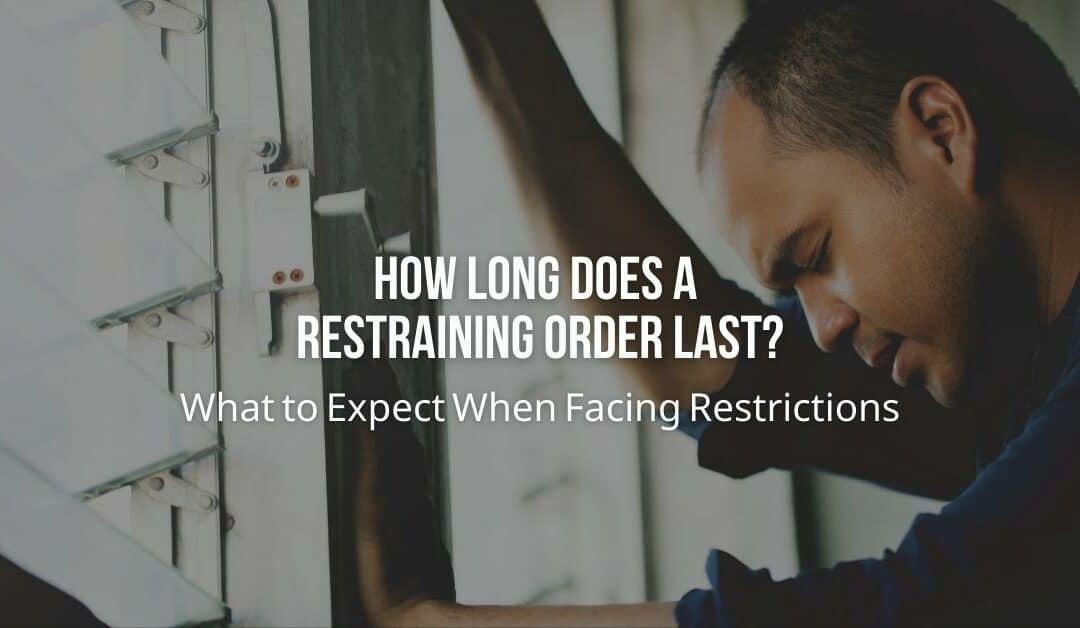When you’re under a restraining order, it’s hard to think about anything else. You may wonder how long you’ll have to live with the restrictions and when a court will restore your rights. Let’s explore the different types of restrictions you may face and answer the question, “How long does a restraining order last?”
How Long Does a Restraining Order Last?
If you currently live with restraining order restrictions, you may wonder how long you have to put up with them. How long until your life is back to normal?
Unfortunately, there is no easy answer to this question. The duration of a restraining order can vary depending on the situation.
In North Carolina, for example, there are three types of restraining orders: domestic violence protective orders, emergency protective orders, and no contact orders. Each type has different provisions and duration.
However, before an order goes into effect, you get a chance to defend yourself against charges in a hearing.
And it’s always wise to have an attorney on your side when defending yourself against serious allegations such as domestic abuse.
50B- Domestic Violence Protective Orders (DVPO)
A domestic violence protective order (DVPO) is the most common type of restraining order. It is issued when there is a threat of physical harm or actual physical harm between family, household members, or sexual partners.
A Domestic Violence Protective Order, often called a “DVPO” or a “50B order,” is a court order that requires you to stay away from the victim. You can also face leaving your home, not seeing any children, and loss of gun rights. Law enforcement can arrest you on the spot for violating the order.
However, you do get a chance to defend yourself against these allegations in a domestic violence hearing. The hearing is your chance to let the judge know what is happening.
In North Carolina, a “permanent” DVPO can last up to one year but can renew for up to two years. (2)
Emergency (Ex Parte) Temporary DVPO Length
Some counties allow magistrates to grant emergency DVPOs outside of business hours, but others only grant DVPOs on business days when the courthouse is open. Your local domestic violence agency can give you more information about your county’s process.
With an emergency order, a court may grant protections to victims before informing you about the order.
“If a judge finds that the defendant (the person the case was filed against) committed domestic violence, the judge will grant an ex parte order. This is a short-term DVPO that lasts until the next hearing. The judge will include the date for the next hearing on the order.” (3)
If you face an emergency DVPO, you get a chance to defend yourself in a hearing. Your best bet to defend against these allegations is with an experienced domestic violence attorney. You need someone on your side when facing these kinds of serious accusations.
50C- No Contact Orders
Someone may receive a no-contact order if they are a sexual assault or stalking victim and do NOT have a “personal relationship” with you.
The main difference between a 50C and 50B is that law enforcement will not arrest you for violating a 50C order. Instead, the victim must go to court and ask the judge to hold you in contempt of court.
Defending Yourself at a Hearing
You’ll need to attend any hearings with your domestic violence attorney. The alleged victim will also participate in any hearings with their attorney.
The judge will generally ask if the victim (plaintiff) wants to move forward executing a DVPO. If the victim wants to continue, the judge will ask you if you consent to the order.
If you don’t consent to the order, there will be a trial to determine whether the judge will grant the DVPO.
At the trial, you and the alleged victim may both present evidence, including witnesses and documents, about whether the defendant committed an act of domestic violence against the plaintiff.
Working with your attorney will give you the best defense against any accusations related to a DVPO.
However, you may also face criminal charges and hearings associated with criminal charges such as battery, kidnapping, weapons charges, assault, or sexual offenses.
As you can see, the duration of a restraining order varies depending on the situation. You should contact a domestic violence defense lawyer if you have any questions about your specific case. They will be able to give you more information about the provisions of your restraining order and how to fight against the allegations of violence or abuse.
We Can Help
At Cape Fear Law, we understand that domestic violence cases are not always cut and dry. Sometimes, false allegations get thrown about. If you’re facing a hearing for domestic violence, you can count on us to defend your rights in civil and criminal court if needed. We understand this is an incredibly challenging time, and we’re here to help.
Contact us today and get started defending yourself against charges. Trust us to help protect your rights going forward!

